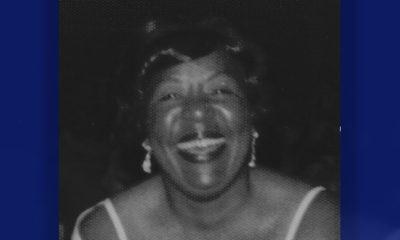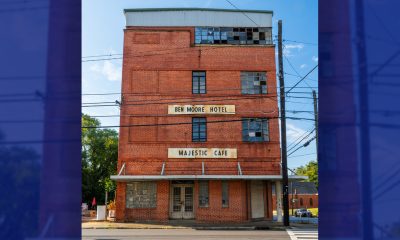Politics
Edward Brooke, 1st Black Elected U.S. Senator, Dies

This Oct. 28, 2009, file photo shows President Barack Obama greeting former Massachusetts Sen. Edward Brooke in the Rotunda on Capitol Hill in Washington, during a ceremony where Brooke received the Congressional Gold Medal. (AP Photo/Gerald Herbert, File)
Sylvia Wingfield and Mark Pratt, ASSOCIATED PRESS
BOSTON (AP) — Former U.S. Sen. Edward W. Brooke, a liberal Republican who became the first black in U.S. history to win popular election to the Senate, died Saturday. He was 95.
Brooke died of natural causes at his Coral Gables, Florida, home, said Ralph Neas, Brooke’s former chief counsel. Brooke was surrounded by his family.
Brooke was elected to the Senate in 1966, becoming the first black to sit in that branch from any state since Reconstruction and one of nine blacks who have ever served there — including Barack Obama.
Brooke told The Associated Press he was “thankful to God” that he lived to see Obama’s election. And the president was on hand in October 2009 when Brooke was presented with the Congressional Gold Medal, the highest award Congress has to honor civilians. Obama hailed Brooke as “a man who’s spent his life breaking barriers and bridging divides across this country.”
Senate Republican Leader Mitch McConnell recalled his first impression of the newly elected senator when McConnell was a Senate staffer and described Brooke as “a model of courage and honesty in office.”
“… even from across the Senate chamber, you could sense that this was a Senator of historic importance,” McConnell said in a statement Saturday. “Indeed, he was.”
A Republican in a largely Democratic state, Brooke was one of Massachusetts’ most popular political figures during most of his 12 years in the Senate.
Massachusetts Democratic Gov. Deval Patrick, the state’s first black governor, remembered Brooke for his unselfish public service.
“He carried the added honor and burden of being ‘the first’ and did so with distinction and grace,” Patrick said. “I have lost a friend and mentor. America has lost a superb example of selfless service.”
Brooke earned his reputation as a Senate liberal in part by becoming the first Republican senator to publicly urge President Richard Nixon to resign. He helped lead the forces in favor of the Equal Rights Amendment and was a defender of school busing to achieve racial integration, a bitterly divisive issue in Boston.
He also lent his name to the Brooke amendment to the federal housing act, passed in 1969, which limited to 25 percent the amount of income a family must pay for rent in public housing.
However, late in his second term, Brooke divorced his wife of 31 years, Remigia, in a stormy proceeding that attracted national attention.
Repercussions from the case spurred an investigation into his personal finances by the Senate Ethics Committee and a probe by the state welfare department and ultimately cost him the 1978 election. He was defeated by Democrat Rep. Paul E. Tsongas.
Tsongas’ widow, U.S. Rep. Nikki Tsongas, said Saturday that Brooke’s career was “as courageous as it was historic.”
In a Boston Globe interview in 2000, Brooke recalled the pain of losing his bid for a third term.
“It was just a divorce case. It was never about my work in the Senate. There was never a charge that I committed a crime, or even nearly committed a crime,” Brooke said.
In 2008, pioneering newswoman Barbara Walters said she had an affair with the then-married Brooke in the 1970s, but it ended before he lost the 1978 election. She called him “exciting” and “brilliant.”
Brooke received the Presidential Medal of Freedom in a White House ceremony in 2004. Five years later, when Brooke received the congressional honor in Washington, he cited the issues facing Congress — health care, the economy and the wars overseas — and called on lawmakers to put their partisan differences aside.
“We’ve got to get together,” Brooke said, turning his eyes to Senate GOP Leader Mitch McConnell of Kentucky. “We have no alternative. There’s nothing left. It’s time for politics to be put aside on the back burner.”
As Brooke sought the Senate seat in 1966, profiles in the national media reminded readers that he had won office handily in a state where blacks made up just 2 percent of the population — the state that had also given the nation its only Roman Catholic president, John F. Kennedy.
He beat Democrat Endicott Peabody, a former governor who also supported civil rights, by a 3-to-2 margin despite predictions of a “white backlash” against him.
Commenting on Brooke’s election and other developments that day, Martin Luther King Jr. commented that “despite appeals to bigotry of an intensity and vulgarity never before witnessed in the North, millions of white voters remained unshaken in their commitment to decency.”
Brooke had parlayed his probes of local corruption into a successful run for state attorney general in 1962 when he became the highest ranking black elected official in the nation. He won re-election as attorney general in 1964 even though Democrats dominated other races.
Somewhat aloof from the civil rights movement of the 1960s, especially the militant wing, he said blacks had to win allies, not fight adversaries. But he also said of civil rights leaders: “Thank God we have them. But everyone has to do it in the best way he can.”
He had refused to endorse Sen. Barry Goldwater for president in 1964, commenting later, “You can’t say the Negro left the Republican Party; the Negro feels he was evicted from the Republican Party.”
The son of a Veterans Administration lawyer, Brooke was raised in a middle-class black section of Washington, attending segregated schools through his graduation from Howard University in 1941. He served in an all-black combat unit in World War II, and later settled in Boston after graduating from Boston University Law School.
Brooke was diagnosed with breast cancer in 2002 and went public the following year, saying he wanted to encourage men to perform self-examinations and advocating that insurance companies cover male mammograms.
Brooke is survived by his second wife, Anne Fleming Brooke; their son Edward Brooke IV; his daughters from his first marriage, Remi Goldstone and Edwina Petit; stepdaughter Melanie Laflamme, and four grandchildren.
Copyright 2015 The Associated Press. All rights reserved. This material may not be published, broadcast, rewritten or redistributed.
###
Activism
Oakland Post: Week of December 31, 2025 – January 6, 2026
The printed Weekly Edition of the Oakland Post: Week of – December 31, 2025 – January 6, 2026

To enlarge your view of this issue, use the slider, magnifying glass icon or full page icon in the lower right corner of the browser window.
Activism
2025 in Review: Seven Questions for Assemblymember Lori Wilson — Advocate for Equity, the Environment, and More
Her rise has also included several historic firsts: she is the only Black woman ever appointed to lead the influential Assembly Transportation Committee, and the first freshman legislator elected Chair of the California Legislative Black Caucus. She has also been a vocal advocate for vulnerable communities, becoming the first California legislator to publicly discuss being the parent of a transgender child — an act of visibility that has helped advanced representation at a time when political tensions related to social issues and culture have intensified.

By Edward Henderson, California Black Media
Assemblymember Lori D. Wilson (D-Suisun City) joined the California Legislature in 2022 after making history as Solano County’s first Black female mayor, bringing with her a track record of fiscal discipline, community investment, and inclusive leadership.
She represents the state’s 11th Assembly District, which spans Solano County and portions of Contra Costa and Sacramento Counties.
Her rise has also included several historic firsts: she is the only Black woman ever appointed to lead the influential Assembly Transportation Committee, and the first freshman legislator elected Chair of the California Legislative Black Caucus. She has also been a vocal advocate for vulnerable communities, becoming the first California legislator to publicly discuss being the parent of a transgender child — an act of visibility that has helped advanced representation at a time when political tensions related to social issues and culture have intensified.
California Black Media spoke with Wilson about her successes and disappointments this year and her outlook for 2026.
What stands out as your most important achievement this year?
Getting SB 237 passed in the Assembly. I had the opportunity to co-lead a diverse workgroup of colleagues, spanning a wide range of ideological perspectives on environmental issues.
How did your leadership contribute to improving the lives of Black Californians this year?
The Black Caucus concentrated on the Road to Repair package and prioritized passing a crucial bill that remained incomplete during my time as chair, which establishes a process for identifying descendants of enslaved people for benefit eligibility.
What frustrated you the most this year?
The lack of progress made on getting Prop 4 funds allocated to socially disadvantaged farmers. This delay has real consequences. These farmers have been waiting for essential support that was promised. Watching the process stall, despite the clear need and clear intent of the voters, has been deeply frustrating and reinforces how much work remains to make our systems more responsive and equitable.
What inspired you the most this year?
The resilience of Californians persists despite the unprecedented attacks from the federal government. Watching people stay engaged, hopeful, and determined reminded me why this work matters and why we must continue to protect the rights of every community in our state.
What is one lesson you learned this year that will inform your decision-making next year?
As a legislator, I have the authority to demand answers to my questions — and accept nothing less. That clarity has strengthened my approach to oversight and accountability.
In one word, what is the biggest challenge Black Californians are facing currently?
Affordability and access to quality educational opportunities.
What is the goal you want to achieve most in 2026?
Advance my legislative agenda despite a complex budget environment. The needs across our communities are real, and even in a tight fiscal year, I’m committed to moving forward policies that strengthen safety, expand opportunity, and improve quality of life for the people I represent.
Activism
2025 in Review: Seven Questions for Assemblymember Tina McKinnor, Champion of Reparations, Housing and Workers’ Rights
In 2025, McKinnor pushed forward legislation on renters’ protections, re-entry programs, reparations legislation, and efforts to support Inglewood Unified School District. She spoke with California Black Media about the past year and her work. Here are her responses.

By Joe W. Bowers Jr., California Black Media
Assemblymember Tina McKinnor (D-Inglewood) represents
California’s 61st Assembly District.
As a member of the California Legislative Black Caucus (CLBC),
McKinnor was elected in 2022. She chairs the Los Angeles County Legislative Delegation and leads the Assembly Public Employment and Retirement Committee. McKinnor also served as a civic engagement director, managed political campaigns, and worked as chief of staff for former Assemblymembers Steven Bradford and Autumn Burke.
In 2025, McKinnor pushed forward legislation on renters’ protections, re-entry programs, reparations legislation, and efforts to support Inglewood Unified School District. She spoke with California Black Media about the past year and her work. Here are her responses.
Looking back on 2025, what do you see as your biggest win?
Assembly Bill (AB) 628. If rent is $3,000, people should at least have a stove and a refrigerator. It’s ridiculous that people were renting without basic appliances.
I’m also proud that I was able to secure $8.4 million in the state budget for people coming home from incarceration. That includes the Homecoming Project, the menopause program for incarcerated women, and the Justice Leaders Program.
How did your leadership help make life better for Black Californians this year?
After the Eaton Fire, I pushed to get the same kind of support for affected areas that wealthier regions get after disasters.
I also did a lot of work building political power— establishing the Black Legacy PAC and California for All of Us PAC so we could support Black candidates and educate voters. We also called voters to make sure they understood Prop 50.
People need to understand this: there are only 12 Black legislators in the Capitol. Folks act like we can just walk in and pass reparations, but that’s not how it works.
What frustrated you most this year?
The governor did not have the political will to sign these bills: AB 57 and AB 62. They both passed overwhelmingly in the Assembly and the Senate. We did the work. The only person who didn’t have the political will to sign them was the governor.
The public needs to ask the governor why he didn’t sign the bills. We can’t keep letting people off the hook. He has to answer.
I also introduced AB 51 — the bill to eliminate interest payments on Inglewood Unified School District’s long-standing state loan — held in the Appropriations Committee. That was frustrating,
What inspired you most in 2025?
The civil rights trip to Alabama was life changing. We visited the Legacy Museum and the National Memorial for Peace and Justice. We took members of the Black, Latino, Jewish, and API caucuses with us. It changed all of us.
People aren’t always against us — they just don’t know our history.
What’s one lesson from 2025 that will shape how you approach decisions next year?
The legislative trip to Norway taught me that collaboration matters. Government, labor, and industry sit down together there. They don’t make villains. Everybody doesn’t get everything they want, but they solve problems.
What’s the biggest challenge facing Black Californians in one word?
Inequity. It shows up in housing, wealth, stress – all these things.
What’s the number one goal you want to accomplish in 2026?
Bringing back AB 57 and AB 62, and securing money for the Inglewood Unified loan interest forgiveness.
-

 Bay Area4 weeks ago
Bay Area4 weeks agoPost Salon to Discuss Proposal to Bring Costco to Oakland Community meeting to be held at City Hall, Thursday, Dec. 18
-

 Activism3 weeks ago
Activism3 weeks agoMayor Lee, City Leaders Announce $334 Million Bond Sale for Affordable Housing, Roads, Park Renovations, Libraries and Senior Centers
-

 Activism4 weeks ago
Activism4 weeks agoOakland Post: Week of December 10 – 16, 2025
-

 Activism3 weeks ago
Activism3 weeks agoOakland School Board Grapples with Potential $100 Million Shortfall Next Year
-

 Arts and Culture4 weeks ago
Arts and Culture4 weeks agoFayeth Gardens Holds 3rd Annual Kwanzaa Celebration at Hayward City Hall on Dec. 28
-

 Activism3 weeks ago
Activism3 weeks ago2025 in Review: Seven Questions for Black Women’s Think Tank Founder Kellie Todd Griffin
-

 Advice3 weeks ago
Advice3 weeks agoCOMMENTARY: If You Don’t Want Your ‘Black Card’ Revoked, Watch What You Bring to Holiday Dinners
-

 Activism3 weeks ago
Activism3 weeks agoAnn Lowe: The Quiet Genius of American Couture

























































